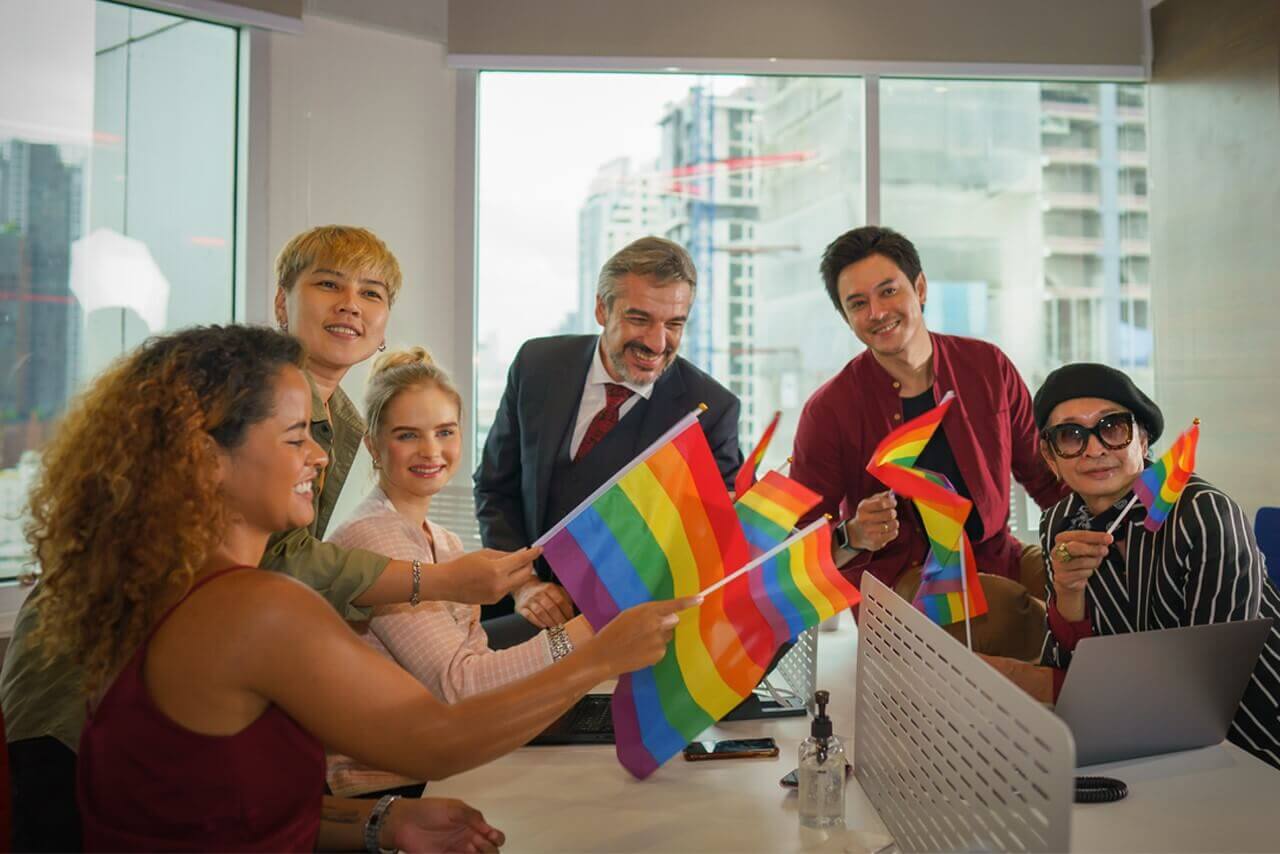Pride at Work: Why Inclusion Still Matters in 2025

Pride Month, traditionally celebrated each June, is a time to uplift LGBTQ+ voices, reflect on progress made, and recommit to creating truly inclusive spaces. It’s about recognising that health, wellbeing, and dignity belong to every individual, no matter who they love or how they identify. It’s a vibrant and inclusive celebration that honours the LGBTQ+ community’s history, achievements, and ongoing struggle for equality.
However, in 2025, the landscape for Pride campaigns and public support has shifted. A new political climate has led many US companies to pull back from public DEI efforts, scale down Pride-themed campaigns, or omit DEI language from external materials. These decisions, framed as risk management, raise a critical question: Do we still remember why Pride exists in the first place?
Why Pride Still Matters Despite the Changing Climate
Pride was born from protest, from the Stonewall Uprising in June 1969, when LGBTQIA+ individuals, led by trans women of colour, resisted systemic discrimination. Pride Month remains a call for visibility, courage, and action.
Despite perceptions of declining importance, the need for Pride remains urgent:
- Visibility matters. Living openly affirms one’s right to joy and safety. Every rainbow flag is a beacon.
- Rights are not guaranteed. Globally, hard-won rights are facing rollbacks, particularly in areas such as transgender healthcare and legal recognition.
- Inequalities persist. LGBTQ+ individuals still face barriers in employment, healthcare, and housing.
- Silence sends a message. A lack of visible support is often interpreted as indifference or complicity.
Pride is not just a moment; it is a movement, a lifeline, a protest, a celebration, and a promise to future generations: you are seen. You belong.
The Changing Workplace: DEI and LGBTQ+ Inclusion in 2025
In 2025, many companies find themselves walking a tightrope. The political climate, particularly in countries like the US and UK, has created unease around anything labelled “DEI”. As a result, some businesses have scaled back Pride visibility, removed inclusive language from their websites, or cancelled diversity training altogether, citing reputational risk.
But what message does this send?
For LGBTQ+ employees, this quiet withdrawal often feels like abandonment. Consider the employee who once proudly wore their rainbow lanyard during Pride Month, only to be told this year that the company “isn’t doing anything official” to avoid external backlash. Or another employee who had just come out at work, only to see her employer erase all mention of LGBTQ+ inclusion from its internal training portal.
These are not hypothetical stories, they reflect a very real atmosphere of uncertainty.
And yet, this is precisely the moment when support matters most.
A Shift from Optics to Impact
What we’re seeing now is a transformation: DEI is evolving from a performative, public-facing effort to one grounded in internal resilience. It’s less about the flags in the window and more about whether your people feel psychologically safe, heard, and valued behind closed doors.
The question isn’t just “Are we showing up on social media?” It’s “Are our policies truly protecting people? Are our leaders walking the talk?”
The Expectation Gap
A February 2025 industry survey found that 93% of Chief Diversity Officers believe LGBTQ+ employees are the group most in need of active support from the private sector today. This isn’t just about Pride campaigns. It’s about safeguarding rights, mental health, career progression, and dignity.
And this gap is visible across organisations of every size. From tech start-ups in Dublin to multinational banks in Tokyo, employees are paying attention. A trans software engineer in Singapore shared in a recent interview:
“I don’t need my employer to hang a flag. I need them to guarantee that my healthcare plan covers gender-affirming care and that my manager has the training to support me properly.”
Silence Isn’t Neutral
In this environment, silence doesn’t read as safety, it reads as surrender. When companies go quiet in the face of rising hostility or controversy, LGBTQ+ employees often interpret it as a retreat from values. And once trust is lost, it’s incredibly hard to rebuild.
But the reverse is also true: companies that continue to show up, clearly, respectfully, and consistently, are remembered as dependable allies. Those who localise their actions, elevate internal voices, and reinforce support year-round create cultures that not only retain talent but also attract it.
Inclusion as Strategy: Why It Matters and What Employers Can Do in 2025
Inclusion isn’t just the right thing to do; it’s the smart thing to do. In 2025, with public discourse becoming more polarised and workplace expectations shifting rapidly, building inclusive cultures is no longer optional. It’s a strategic imperative.
When employees feel safe enough to be themselves, they’re more engaged, more loyal, and more likely to stay. For LGBTQ+ professionals in particular, inclusion isn’t just another slogan, it’s whether their healthcare plan recognises their needs, whether their team leaders understand gender identity, and whether they’ll be seen and heard in the moments that matter.
One of our recruiters in London recently shared:
“The biggest shift I’ve seen is candidates actively asking about inclusion during interviews, not after. They want to know: ‘What does your company actually do to support LGBTQ+ staff?’”
It’s not just candidates. Consumers and their allies believe brands should be visibly supportive now more than ever. When companies align their external messaging with internal actions, they earn more than just short-term loyalty they build long-term trust. So, how can employers step up not just during Pride, but year-round?
Practical Steps for Meaningful Inclusion
- 1. Audit and enhance your policies.
Begin with the basics: ensure your DEI, anti-harassment, and parental leave policies explicitly include protections for sexual orientation, gender identity, and expression. Policies should go beyond avoiding harm they should actively create belonging. - 2. Review your benefits through an LGBTQ+ lens.
Does your healthcare cover gender-affirming care? Are mental health resources trauma-informed and inclusive? Are your family policies reflective of all family types? Inclusive benefits are more than a perk they can be life-changing. - 3. Invest in year-round DEI training.
Inclusion should be part of onboarding, leadership development, and everyday learning. Equip managers to support LGBTQ+ staff thoughtfully, and ensure that responsibility doesn’t fall solely on marginalised employees to educate others. - 4. Foster visibility with intention.
Encourage pronouns in email signatures, open meetings with name/pronoun sharing, and spotlight LGBTQ+ voices across internal comms and events. Partner with ERGs to lead celebrations and awareness days that feel empowering, not performative. - 5. Build trust by listening and acting.
Host confidential listening sessions. Run anonymous surveys. Partner with LGBTQ+ employees to co-design initiatives. The most meaningful progress comes from consistent, small actions driven by real input. - 6. Collect better data to drive better outcomes.
If your HR systems only allow binary gender options, it’s time to update them. Gathering inclusive demographic data respectfully and transparently helps inform better benefits, support services, and engagement strategies.
At its core, meaningful inclusion is about making it easier for people to show up as themselves and knowing they’ll be respected when they do. It’s about turning values into action and action into everyday culture.
Morgan McKinley’s Commitment
At Morgan McKinley, we believe that inclusion is not a campaign; it’s a culture.
In a world that is still learning how to embrace difference, we’re committed to creating spaces where everyone feels safe, seen, and supported.
Our promise is grounded in action:
- We are building a workplace where inclusion is lived, not just stated through safe spaces, peer networks, and open conversations.
- We continue to evolve our policies to reflect the real lives of our people, ensuring they feel protected, supported, and respected at every stage.
- We platform LGBTQ+ voices within our teams, in our content, and across the industry so that representation becomes the norm, not the exception.
Pride in 2025 means showing up, especially when it’s hard. It’s about more than colourful logos or temporary taglines. It’s about how we advocate, support, and lead with integrity.
As businesses and individuals, we each have a role to play. For us at Morgan McKinley, that role is clear: to build workplaces where no one has to wonder if they belong. To be vocal when it matters. To keep learning, unlearning, and improving.














